Contents
| « Prev | DORE BIBLE GALLERY, COMPLETE | Next » |
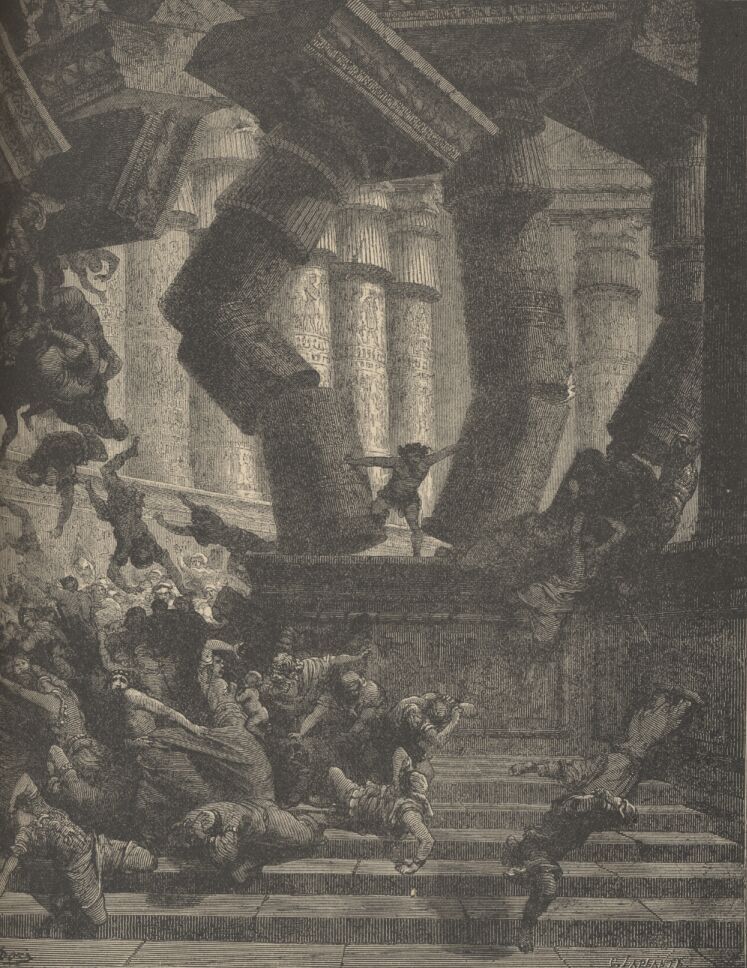
But the Philistines took him, and put out his eyes, and brought him down to Gaza, and bound him with fetters of brass; and he did grind in the prison house.
Howbeit the hair of his head began to grow again after he was shaven.
Then the lords of the Philistines gathered them together for to offer a great sacrifice unto Dagon their god, and to rejoice: for they said, Our God hath delivered Samson our enemy into our hand. And when the people saw him, they praised their god: for they said, Our god hath delivered into our hands our enemy, and the destroyer of our country, which slew many of us. And it came to pass, when their hearts were merry, that they said, Call for Samson, that he may make us sport. And they called for Samson out of the prison house; and he made them sport: and they set him between the pillars. And Samson said unto the lad that held him by the hand, Suffer me that I may feel the pillars whereupon the house standeth, that I may lean upon them. Now the house was full of men and women; and all the lords of the Philistines were there; and there were upon the roof about three thousand men and women, that beheld while Samson made sport.
And Samson called unto the Lord, and said, O Lord God, remember me, I pray thee, and strengthen me, I pray thee, only this once, O God, that I may be at once avenged of the Philistines for my two eyes. And Samson took hold of the two middle pillars upon which the house stood, and on which it was borne up, of the one with his right hand, and of the other with his left. And Samson said, Let me die with the Philistines. And he bowed himself with all his might; and the house fell upon the lords, and upon all the people that were therein. So the dead which he slew at his death were more than they which he slew in his life.
Then his brethren and all the house of his father came down, and took him, and brought him up, and buried him between Zorah and Eshtaol in the burying-place of Manoah his father. And he judged Israel twenty years.—Judges xvi, 21-31
NAOMI AND HER DAUGHTERS IN LAW.
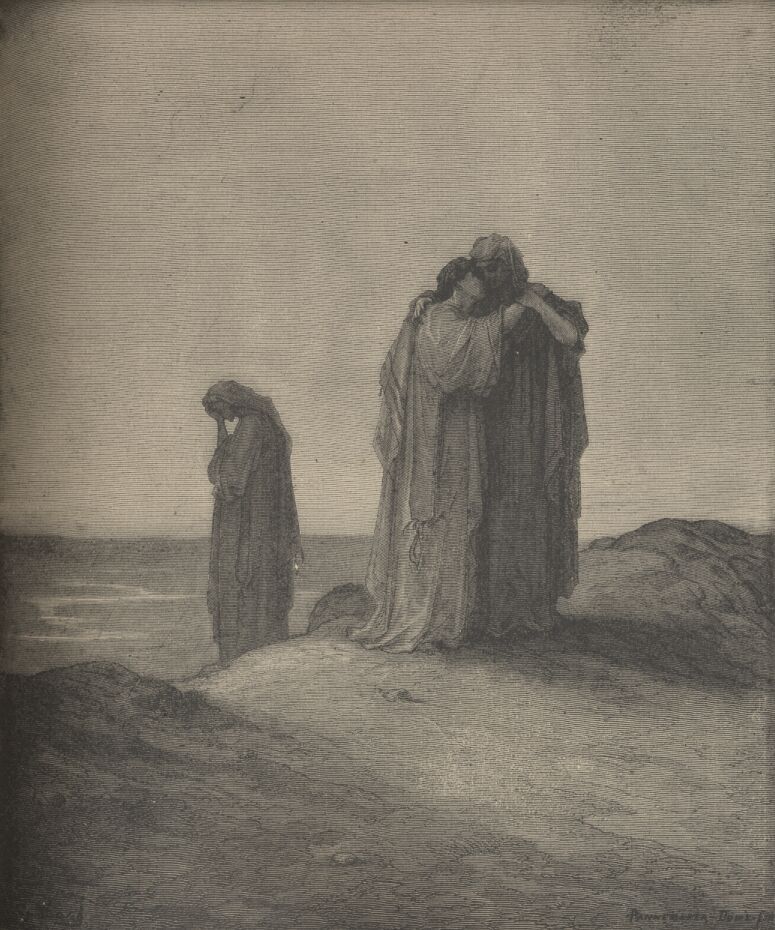
Now it came to pass in the days when the judges ruled, that there was a famine in the land. And a certain man of Beth-lehem-judah went to sojourn in the country of Moab, he, and his wife, and his two sons. And the name of the man was Elimelech, and the name of his wife Naomi, and the name of his two sons Mahlon and Chilion, Ephrathites of Beth-lehem-judah. And they came into the country of Moab, and continued there. And Elimelech Naomi's husband died; and she was left, and her two sons. And they took them wives of the women of Moab; the name of the one was Orpah, and the name of the other Ruth: and they dwelt there about ten years. And Mahlon and Chilion died also both of them; and the woman was left of her two sons and her husband.
Then she arose with her daughters in law, that she might return from the country of Moab for she had heard in the country of Moab how that the Lord had visited his people in giving them bread. Wherefore she went forth out of the place where she was, and her two daughters in law with her; and they went on the way to return unto the land of Judah.
And Naomi said unto her two daughters in law, Go, return each to her mother's house the Lord deal kindly with you, as ye have dealt with the dead, and with me. The Lord grant you that ye may find rest, each of you in the house of her husband.
Then she kissed them; and they lifted up their voice, and wept. And they said unto her, Surely we will return with thee unto thy people.
And Naomi said, Turn again, my daughters: why will ye go with me? are there yet any more sons in my womb, that they may be your husbands? Turn again, my daughters, go your way; for I am too old to have a husband. If I should say, I have hope, if I should have a husband also to night, and should also bear sons; would ye tarry for them till they were grown? would ye stay for them from having husbands? nay, my daughters; for it grieveth me much for your sakes that the hand of the Lord is gone out against me.
And they lifted up their voice, and wept again: and Orpah kissed her mother in law but Ruth cleave unto her.
And she said, Behold, thy sister in law is gone back unto her people, and unto her gods return thou after thy sister in law.
And Ruth said, Entreat me not to leave thee, or to return from following after thee: for whither thou goest, I will go; and where thou lodgest, I will lodge: thy people shall be my people, and thy God my God: Where thou diest, will I die, and there will I be buried: the Lord do so to me, and more also, if ought but death part thee and me.
When she saw that she was steadfastly minded to go with her, then she left speaking unto her.
So they two went until they came to Beth-lehem.—Ruth i, 1-19.
RUTH AND BOAZ.
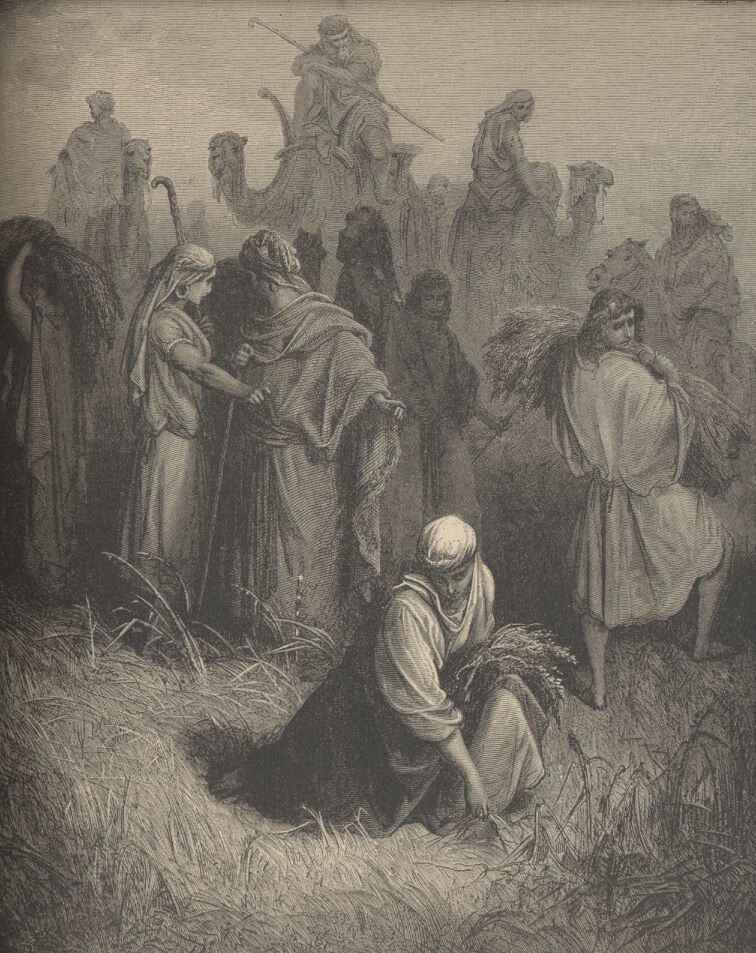
And Naomi had a kinsman of her husband's, a mighty man of wealth, of the family of Elimelech; and his name was Boaz.
And Ruth the Moabitess said unto Naomi, Let me now go to the field, and glean ears of corn after him in whose sight I shall find grace. And she said unto her, Go, my daughter. And she went, and came and gleaned in the field after the reapers; and her hap was to light on a part of the field belonging unto Boaz, who was of the kindred of Elimelech.
And, behold, Boaz came from Bethlehem, and said unto the reapers, The Lord be with you. And they answered him, The Lord bless thee. Then said Boaz unto his servant that was set over the reapers, Whose damsel is this? And the servant that was set over the reapers answered and said, It is the Moabitish damsel that came back with Naomi out of the country of Moab: and she said, I pray you, let me glean and gather after the reapers among the sheaves: so she came, and hath continued even from the morning until now, that she tarried a little in the house.
Then said Boaz unto Ruth, Hearest thou not, my daughter? Go not to glean in another field, neither go from hence, but abide here fast by my maidens: let thine eyes be on the field that they do reap, and go thou after them: have I not charged the young men that they shall not touch thee? and when thou art athirst, go unto the vessels, and drink of that which the young men have drawn.
Then she fell on her face and bowed herself to the ground, and said unto him, Why have I found grace in thine eyes, that thou shouldest take knowledge of me, seeing I am a stranger?
And Boaz answered and said unto her, It hath fully been shewed me, all that thou hast done unto thy mother in law since the death of thine husband: and how thou hast left thy father and thy mother, and the land of thy nativity, and art come unto a people which thou knewest not heretofore. The Lord recompense thy work, and a full reward be given thee of the Lord God of Israel, under whose wings thou art come to trust.
Then she said, Let me find favor in thy sight, my lord; for that thou hast comforted me, and for that thou hast spoken friendly unto thine handmaid, though I be not like unto one of thine handmaidens.
And Boaz said unto her, At mealtime come thou hither, and eat of the bread, and dip thy morsel in the vinegar. And she sat beside the reapers: and he reached her parched corn, and she did eat, and was sufficed, and left. And when she was risen up to glean, Boaz commanded his young men, saying, Let her glean even among the sheaves, and reproach her not: and let fall also some of the handfuls of purpose for her, and leave them, that she may glean them and rebuke her not.
So she gleaned in the field until even, and beat out that she had gleaned: and it was about an ephah of barley.—Ruth ii, 1-17,
THE RETURN OF THE ARK.
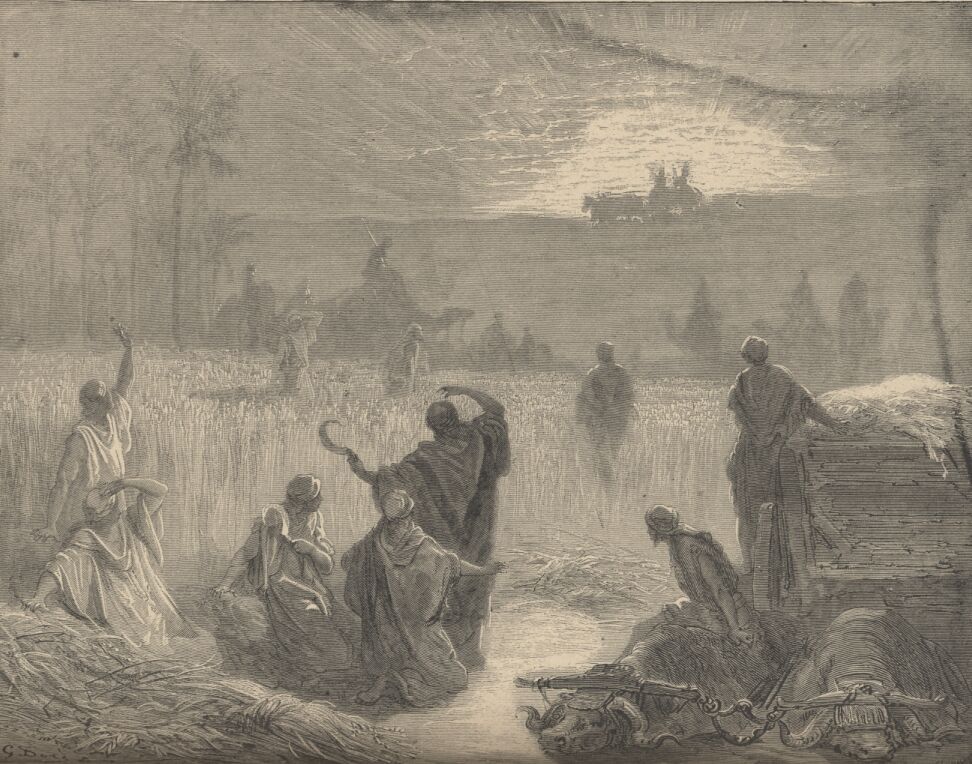
And the ark of the Lord was in the country of the Philistines seven months. And the Philistines called for the priests and the diviners, saying, What shall we do to the ark of the Lord? tell us wherewith we shall send it to his place. And they said, If ye send away the ark of the God of Israel, send it not empty; but in any wise return him a trespass offering: then ye shall be healed, and it shall be known to you why his hand is not removed from you. Then said they, What shall be the trespass offering which we shall return to him? They answered, Five golden emerods, and five golden mice, according to the number of the lords of the Philistines: for one plague was on you all, and on your lords. Wherefore ye shall make images of your emerods, and images of your mice that mar the land; and ye shall give glory unto the God of Israel: peradventure he will lighten his hand from off you, and from off your gods, and from off your land. Wherefore then do ye harden your hearts, as the Egyptians and Pharaoh hardened their hearts? when he had wrought wonderfully among them, did they not let the people go, and they departed? Now therefore make a new cart, and take two milch kine, on which there hath come no yoke, and tie the kine to the cart, and bring their calves home from them: and take the ark of the Lord, and lay it upon the cart; and put the jewels of gold, which ye return him for a trespass offering, in a coffer by the side thereof; and send it away, that it may go. And see, if it goeth up by the way of his own coast to Beth-shemesh, then he hath done us this great evil: but if not, then we shall know that it is not his hand that smote us; it was a chance that happened to us.
And the men did so; and took two milch kine, and tied them to the cart, and shut up their calves at home: and they laid the ark of the Lord upon the cart, and the coffer with the mice of gold and the images of their emerods. And the kine took the straight way to the way of Beth-shemesh, and went along the highway, lowing as they went, and turned not aside to the right hand or to the left; and the lords of the Philistines went after them, unto the border of Beth-shemesh. And they of Beth-shemesh were reaping their wheat harvest in the valley: and they lifted up their eyes, and saw the ark, and rejoiced to see it. And the cart came into the field of Joshua, a Beth-shemite, and stood there, where there was a great stone: and they clave the wood of the cart, and offered the kine a burnt offering unto the Lord.
And the Levites took down the ark of the Lord, and the coffer that was with it, wherein the jewels of gold were, and put them on the great stone: and the men of Beth-shemesh offered burnt offerings and sacrificed sacrifices the same day unto the Lord.—1 Samuel vi, 1-5.
SAUL AND DAVID.
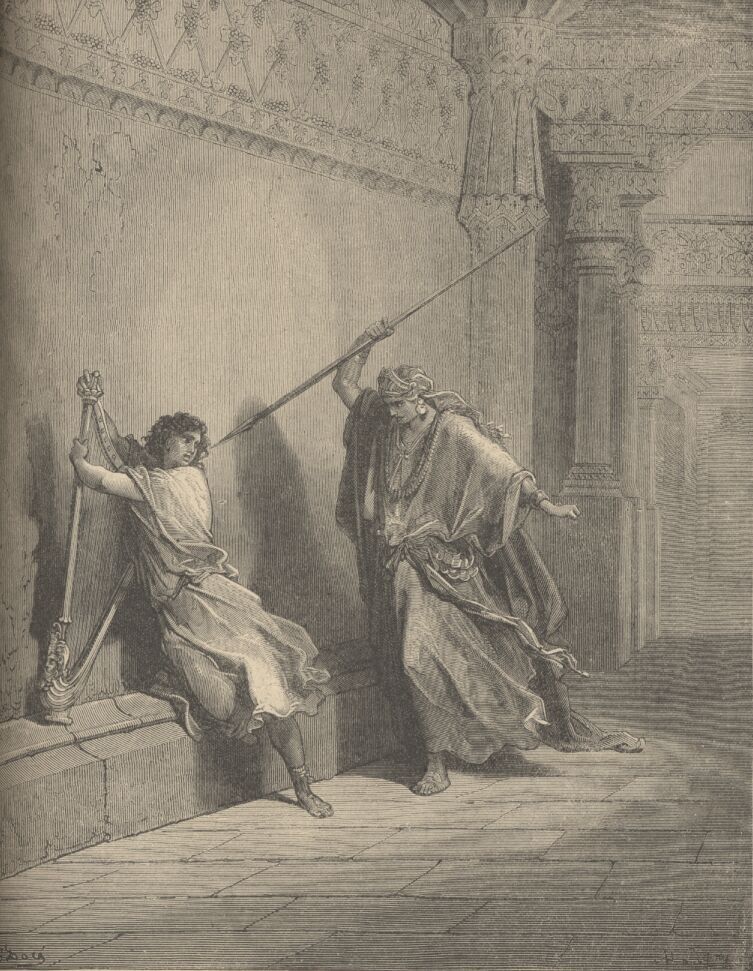
And it came to pass, when he had made an end of speaking unto Saul, that the soul of Jonathan was knit with the soul of David, and Jonathan loved him as his own soul. And Saul took him that day, and would let him go no more home to his father's house.
Then Jonathan and David made a covenant, because he loved him as his own soul. And Jonathan stripped himself of the robe that was upon him, and gave it to David, and his garments, even to his sword, and to his bow, and to his girdle.
And David went out withersoever Saul sent him, and behaved himself wisely: and Saul set him over the men of war, and he was accepted in the sight of all the people, and also in the sight of Saul's servants.
And it came to pass as they came, when David was returned from the slaughter of the Philistine, that the women came out of all cities of Israel, singing and dancing, to meet king Saul, with tabrets, with joy, and with instruments of music. And the women answered one another as they played, and said, Saul hath slain his thousands, and David his ten thousands.
And Saul was very wroth, and the saying displeased him; and he said, "They have ascribed unto David ten thousands, and to me they have ascribed but thousands: and what can he have more but the kingdom?" And Saul eyed David from that day and forward.
And it came to pass on the morrow, that the evil spirit from God came upon Saul, and he prophesied in the midst of the house: and David played with his hand, as at other times: and there was a javelin in Saul's hand. And Saul cast the javelin; for he said, I will smite David even to the wall with it. And David avoided out of his presence twice.—1 Samuel xviii, 1-11.
DAVID SPARING SAUL.
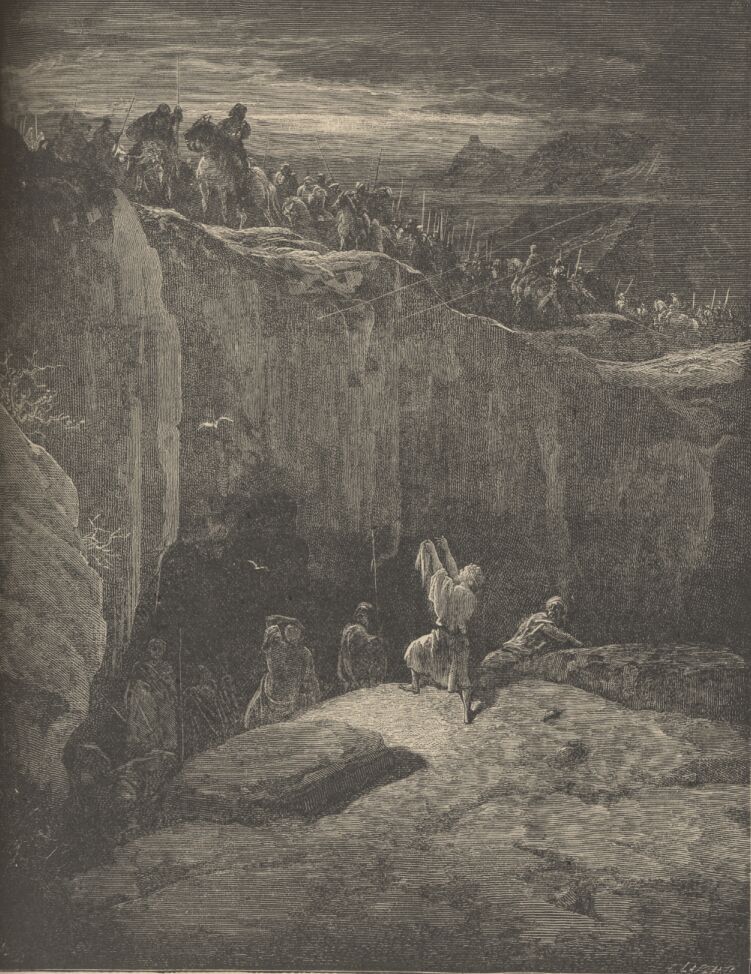
And it came to pass, when Saul was returned from following the Philistines, that it was told him, saying, Behold, David is in the wilderness of Engedi. Then Saul took three thousand chosen men out of all Israel, and went to seek David and his men upon the rocks of the wild goats. And he came to the sheepcotes by the way, where was a cave; and Saul went in to cover his feet: and David and his men remained in the sides of the cave.
And the men of David said unto him, Behold the day of which the Lord said unto thee, Behold, I will deliver thine enemy into thine hand, that thou mayest do to him as it shall seem good unto thee. Then David arose, and cut off the skirt of Saul's robe privily. And it came to pass afterward, that David's heart smote him, because he had cut off Saul's skirt. And he said unto his men, The Lord forbid that I should do this thing unto my master, the Lord's anointed, to stretch forth mine hand against him, seeing he is the anointed of the Lord.
So David stayed his servants with these words, and suffered them not to rise against Saul. But Saul rose up out of the cave, and went on his way. David also arose afterward, and went out of the cave, and cried after Saul, saying, My lord the king. And when Saul looked behind him, David stooped with his face to the earth and bowed himself.
And David said to Saul, Wherefore hearest thou men's words, saying, Behold, David seeketh thy hurt? Behold, this day thine eyes have seen how that the Lord had delivered thee to-day into mine hand in the cave: and some bade me kill thee; but mine eye spared thee; and I said, I will not put forth mine hand against my lord; for he is the Lord's anointed. Moreover, my father, see, yea, see the skirt of thy robe in my hand: for in that I cut off the skirt of thy robe, and killed thee not, know thou and see that there is neither evil nor transgression in mine hand, and I have not sinned against thee; yet thou huntest my soul to take it. The Lord judge between me and thee, and the Lord avenge me of thee: but mine hand shall not be upon thee. As saith the proverb of the ancients, Wickedness proceedeth from the wicked: but mine hand shall not be upon thee. After whom is the king of Israel come out? after whom dost thou pursue? after a dead dog, after a flea. The Lord therefore be judge, and judge between me and thee, and see, and plead my cause, and deliver me out of thine hand.
And it came to pass, when David had made an end of speaking these words unto Saul, that Saul said, Is this thy voice, my son David? And Saul lifted up his voice, and wept. And he said to David, Thou art more righteous than I: for thou hast rewarded me good, whereas I have rewarded thee evil. And thou hast shewed this day how that thou hast dealt well, with me: forasmuch as when the Lord had delivered me into thine hand, thou killedst me not. For if a man find his enemy, will he let him go well away? wherefore the Lord reward thee good for that thou hast done unto me this day. And now, behold, I know well that thou shalt surely be king, and that the kingdom of Israel shall be established in thine hand. Swear now therefore unto me by the Lord, that thou wilt not cut off my seed after me, and that thou wilt not destroy my name out of my father's house.
And David sware unto Saul. And Saul went home; but David and his men gat them up unto the hold.—2 Samuel xxiv, 2-22.
DEATH OF SAUL.
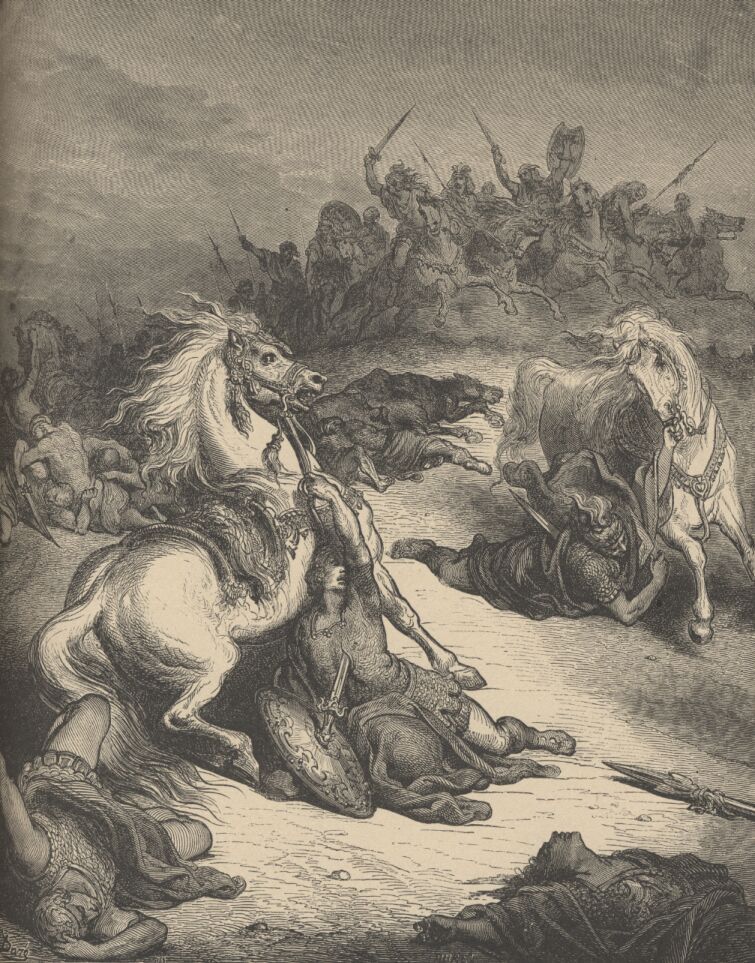
Now the Philistines fought against Israel: and the men of Israel fled from before the Philistines, and fell down slain in mount Gilboa. And the Philistines followed hard upon Saul and upon his sons; and the Philistines slew Jonathan, and Abinadab, and Melchshua, Saul's sons.
And the battle went sore against Saul, and the archers hit him; and he was sore wounded of the archers. Then said Saul unto his armourbearer, Draw thy sword, and thrust me through therewith; lest these uncircumcised come and thrust me through, and abuse me. But his armourbearer would not; for he was sore afraid. Therefore, Saul took a sword, and fell upon it. And when his armourbearer saw that Saul was dead, he fell likewise upon his sword, and died with him.
So Saul died, and his three sons, and his armourbearer, and all his men, that same day together.
And when the men of Israel that were on the other side of the valley, and they that were on the other side Jordan, saw that the men of Israel fled, and that Saul and his sons were dead, they forsook the cities, and fled; and the Philistines came and dwelt in them. And it came to pass on the morrow, when the Philistines came to strip the slain, that they found Saul and his three sons fallen in mount Gilboa. And they cut off his head, and stripped off his armour, and sent into the land of the Philistines round about, to publish it in the house of their idols, and among the people. And they put his armour in the house of Ashtaroth and they fastened his body to the wall of Beth-shan.
And when the inhabitants of Jabesh-gilead heard of that which the Philistines had done to Saul; all the valiant men arose, and went all night, and took the body of Saul and the bodies of his sons from the wall of Beth-shan, and came to Jabesh, and burnt them there. And they took their bones, and buried them under a tree at Jabesh, and fasted seven days. 1 Samuel xxxi.
THE DEATH OF ABSALOM.
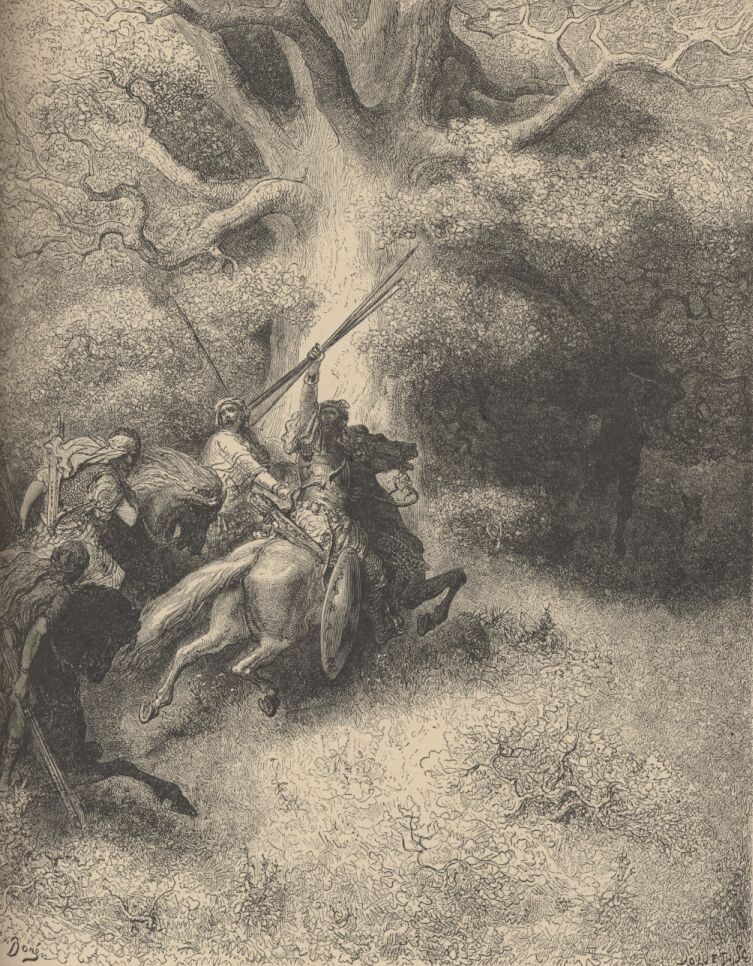
And David numbered the people that were with him, and set captains of thousands and captains of hundreds over them. And David set forth a third part of the people under the hand of Joab, and a third part under the hand of Abishai the son of Zeruiah, Joab's brother, and a third part under the hand of Ittai the Gittite. And the king said unto the people, I will surely go forth with you myself also.
But the people answered, Thou shalt not go forth: for if we flee away, they will not care for us; neither if half of us die, will they care for us: but now thou art worth ten thousand of us: therefore now it is better that thou succor us out of the city.
And the king said unto them, What seemeth you best I will do. And the king stood by the gate side, and all the people came out by hundreds and by thousands. And the king commanded Joab and Abishai and Ittai, saying, Deal gently for my sake with the young man, even with Absalom. And all the people heard when the king gave all the captains charge concerning Absalom.
So the people went out into the field against Israel: and the battle was in the wood of Ephraim; where the people of Israel were slain before the servants of David, and there was there a great slaughter that day, of twenty thousand men. For the battle was there scattered over the face of all the country: and the wood devoured more people that day than the sword devoured.
And Absalom met the servants of David. And Absalom rode upon a mule, and the mule went under the thick boughs of a great oak, and his head caught hold of the oak, and he was taken up between the heaven and the earth; and the mule that was under him went away.
And a certain man saw it, and told Joab, and said, Behold I saw Absalom hanged in an oak.
And Joab said unto the man that told him, And, behold, thou sawest him, and why didst thou not smite him there to the ground? and I would have given thee ten shekels of silver, and a girdle.
And the man said unto Joab, Though I should receive a thousand shekels of silver in mine hand, yet would I not put forth mine hand against the king's son: for in our hearing the king charged thee and Abishai and Ittai, saying, Beware that none touch the young man Absalom. Otherwise I should have wrought falsehood against mine own life: for there is no matter hid from the king, and thou thyself wouldst have set thyself against me.
Then said Joab, I may not tarry thus with thee. And he took three darts in his hand, and thrust them through the heart of Absalom, while he was yet alive in the midst of the oak. And ten young men that bare Joab's armor compassed about and smote Absalom, and slew him. And Joab blew the trumpet, and the people returned from pursuing after Israel: for Joab held back the people. And they took Absalom, and cast him into a great pit in the wood, and laid a very great heap of stones upon him: and all Israel fled every one to his tent.—2 Samuel xviii, 1-17.
DAVID MOURNING OVER ABSALOM.
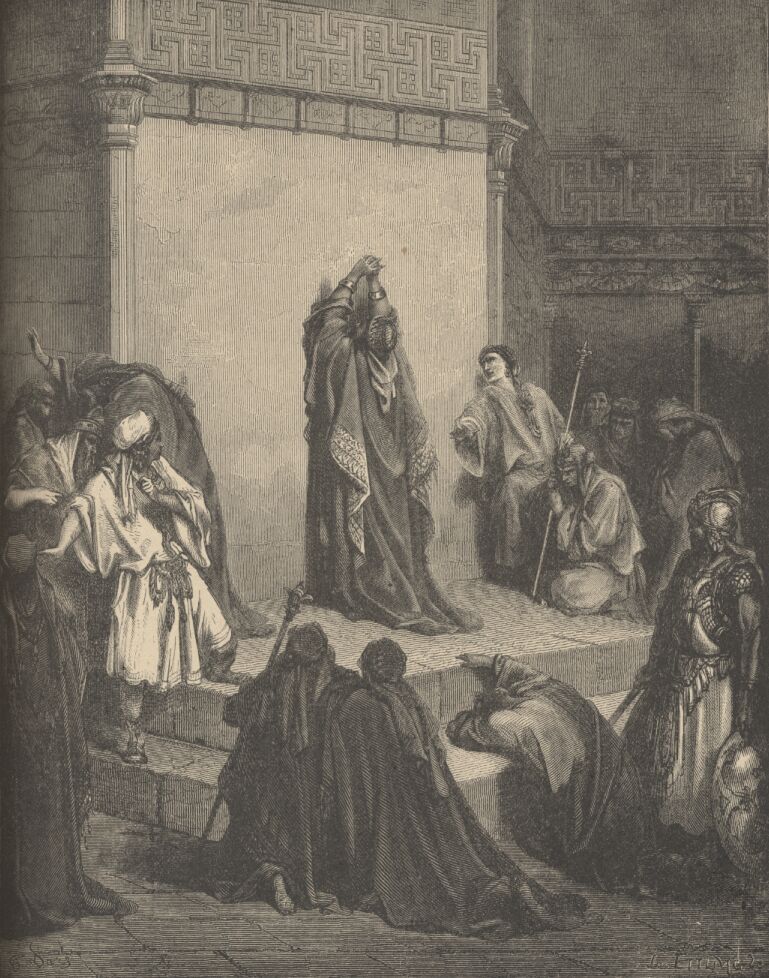
Then said Ahimaaz the son of Zadok, Let me now run, and bear the king tidings, how that the Lord hath avenged him of his enemies. And Joab said unto him, Thou shalt not bear tidings this day, but thou shalt bear tidings another day: but this day thou shalt bear no tidings, because the king's son is dead. Then said Joab to Cushi, Go tell the king what thou hast seen. And Cushi bowed himself unto Joab, and ran. Then said Ahimaaz the son of Zadok yet again to Joab, But howsoever, let me, I pray thee, also run after Cushi. And Joab said, Wherefore wilt thou run, my son, seeing that thou hast no tidings ready? But howsoever, said he let me run. And he said unto him, Run. Then Ahimaaz ran by the way of the plain, and overran Cushi.
And David sat between the two gates: and the watchman went up to the roof over the gate unto the wall, and lifted up his eyes, and looked, and behold a man running alone. And the watchman cried, and told the king. And the king said, If he be alone, there is tidings in his mouth. And he came apace, and drew near. And the watchman saw another man running: and the watchman called unto the porter, and said, Behold another man running alone. And the king said, He also bringeth tidings. And the watchman said, Me thinketh the running of the foremost is like the running of Ahimaaz the son of Zadok. And the king said, He is a good man, and cometh with good tidings.
And Ahimaaz called, and said unto the king, All is well. And he fell down to the earth upon his face before the king, and said, Blessed be the Lord thy God, which hath delivereth up the men that lifted up their hand against my lord the king. And the king said, Is the young man Absalom safe? And Ahimaaz answered, When Joab sent the king's servant, and me thy servant, I saw a great tumult, but I knew not what it was. And the king said unto him, Turn aside, and stand here. And he turned aside, and stood still.
And, behold, Cushi came; and Cushi said, Tidings, my lord the king: for the Lord bath avenged thee this day of all them that rose up against thee. And the king said unto Cushi, Is the young man Absalom safe? And Cushi answered, The enemies of my lord the king, and all that rise against thee to do thee hurt, be as that young man is.
And the king was much moved, and went up to the chamber over the gate, and wept: and as he went, thus he said, O my son Absalom, my son, my son Absalom! would God I had died for thee, O Absalom, my son, my son!
And it was told Joab, Behold the king weepeth and mourneth for Absalom. And the victory that day was turned into mourning unto all the people: for the people heard say that day how the king was grieved for his son. And the people gat them by stealth that day into the city, as people being ashamed steal away when they flee in battle.
But the king covered his face, and the king cried with a loud voice, O my son Absalom, O Absalom, my son, my son!—2 Samuel xviii, 19-33; xix, 1-4.
SOLOMON
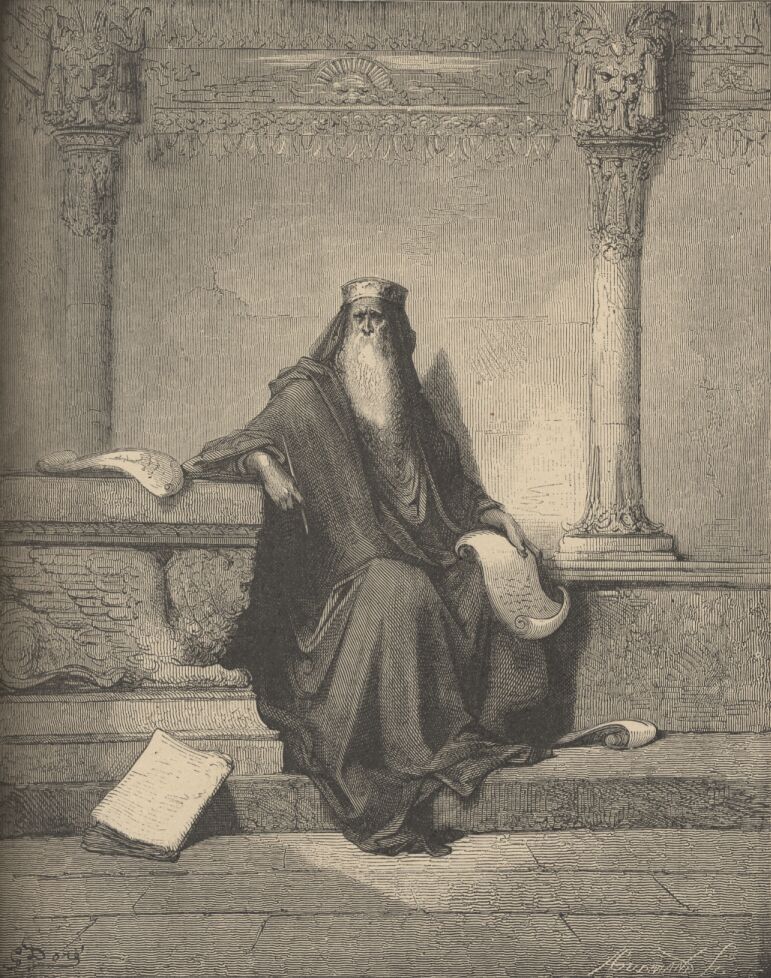
And David took him more concubines and wives out of Jerusalem, after he was come from Hebron: and there were yet sons and daughters born to David. And these be the names of those that were born unto him in Jerusalem; Shammuah, and Shobab, and Nathan, and Solomon, Ibhar also, and Elishua, and Nepheg, and Japhia, and Elishama, and Eliada, and Eliphalet.—2 Samuel v, 13-16.
And David comforted Bath-sheba his wife, and went in unto her, and lay with her: and she bare a son, and he called his name Solomon: and the Lord loved him.—2 Samuel xii, 24.
So David slept with his fathers, and was buried in the city of David. And the days that David reigned over Israel were forty years: seven years reigned he in Hebron, and thirty and three years reigned he in Jerusalem.
Then sat Solomon upon the throne of David his father, and his kingdom was established greatly.—1 Kings ii, 10-12.
And God gave Solomon wisdom and understanding exceeding much, and largeness of heart, even as the sand that is on the sea shore. And Solomon's wisdom excelled the wisdom of all the children of the east country, and all the wisdom of Egypt. For he was wiser than all men; than Ethan the Ezrahite, and Heman, and Chalcol, and Darda, the sons of Mahol: and his fame was in all nations round about. And he spake three thousand proverbs: and his songs were a thousand and five. And he spake of trees, from the cedar tree that is in Lebanon even unto the hyssop that springeth out of the wall: he spake also of beasts, and of fowl, and of creeping things, and of fishes. And there came of all people to hear the wisdom of Solomon, from all kings of the earth, which had heard of his wisdom.—2 Kings iv, 29-34.
THE JUDGMENT OF SOLOMON.
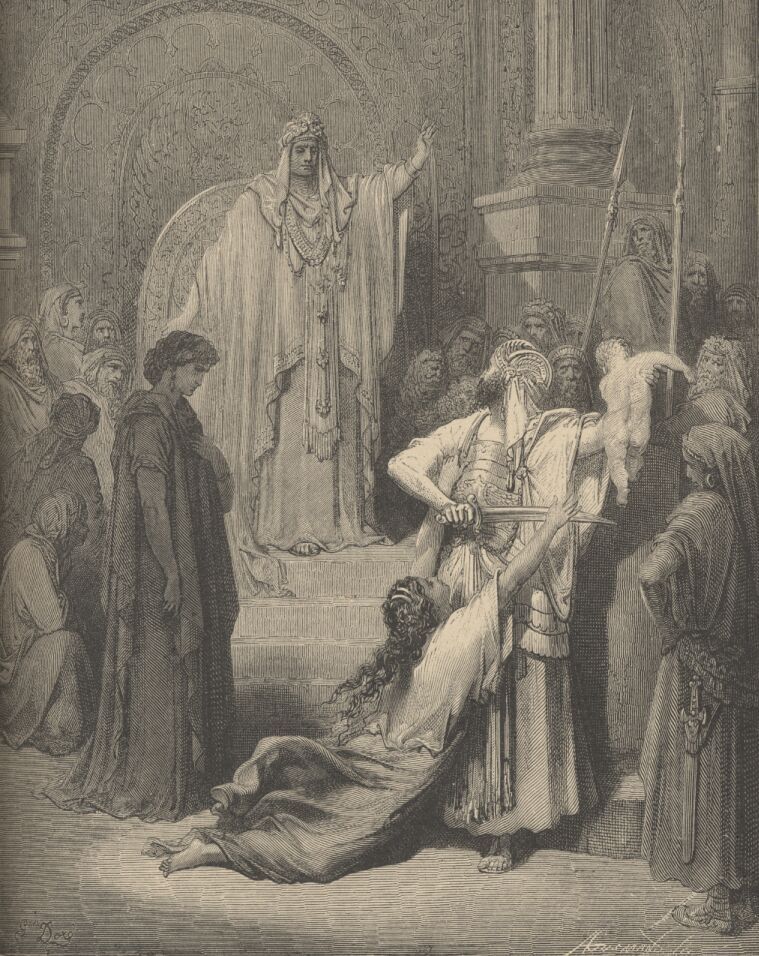
Then came there two women, that were harlots, unto the king, and stood before him.
And the one woman said, O my lord, I and this woman dwell in one house; and I was delivered of a child with her in the house. And it came to pass the third day after that I was delivered, that this woman was delivered also: and we were together; there was no stranger with us in the house, save we two in the house. And this woman's child died in the night; because she overlaid it. And she arose at midnight, and took my son from beside me, while thine handmaid slept, and laid it in her bosom, and laid her dead child in my bosom. And when I rose in the morning to give my child suck, behold, it was dead: but when I had considered it in the morning, behold, it was not my son, which I did bear.
And the other woman said, Nay; but the living is my son, and the dead is thy son.
And this said, No; but the dead is thy son, and, the living is my son.
Thus they spake before the king.
Then said the king, The one saith, This is my son that liveth, and thy son is the dead—and the other saith, Nay; but thy son is the dead, and my son is the living. And the king said, Bring me a sword.
And they brought a sword before the king.
And the king said, Divide the living child in two, and give half to the one, and half to the other.
Then spake the woman whose the living child was unto the king, for her bowels yearned upon her son, and she said, O my lord, give her the living child, and in no wise slay it.
But the other said, Let it be neither mine nor thine, but divide it.
Then the king answered and said, Give her the living child, and in no wise slay it she is the mother thereof.
And all Israel heard of the judgment which the king had judged; and they feared the king: for they saw that the wisdom of God was in him, to do judgment. 1 Kings iii, 16-28.
THE CEDARS DESTINED FOR THE TEMPLE.
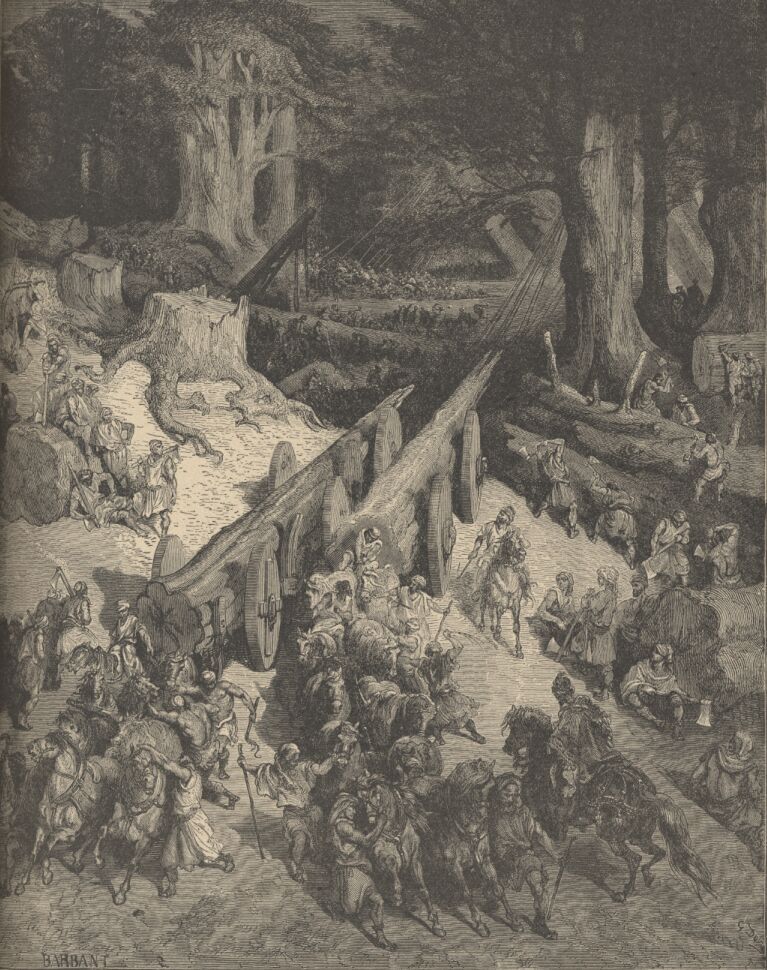
And Hiram king of Tyre sent his servants unto Solomon; for he had heard that they had anointed him king in the room of his father: for Hiram was ever a lover of David.
And Solomon sent to Hiram, saying, Thou knowest how that David my father could not build a house unto the name of the Lord his God for the wars which were about him on every side, until the Lord put them under the soles of his feet. But now the Lord my God hath given me rest on every side, so that there is neither adversary nor evil occurrent. And, behold: I purpose to build a house unto the name of the Lord my God, as the Lord spake unto David my father, saying, Thy son, whom I will set upon thy throne in thy room, he shall build a house unto my name. Now therefore command thou that they hew me cedar trees out of Lebanon; and my servants shall be with thy servants: and unto thee will I give hire for the servants according to all that thou shalt appoint: for thou knowest that there is not among us any that can skill to hew timber like unto the Sidonians.
And it came to pass, when Hiram heard the words of Solomon, that he rejoiced greatly and said, Blessed be the Lord this day, which hath given unto David a wise son over this great, people. And Hiram sent to Solomon, saying, I have considered the things which thou sentest to me for: and I will do all thy desire concerning timber of cedar, and concerning timber of fir: My servants shall bring them down from Lebanon unto the sea; and I will convey them by sea in floats unto the place that thou shalt appoint me, and will cause them to be discharged there, and thou shalt receive them: and thou shalt accomplish my desire, in giving food for my household.
So Hiram gave Solomon cedar trees and fir trees according to all his desire.
And Solomon gave Hiram twenty thousand measures of wheat for food to his household and twenty measures of pure oil: thus gave Solomon to Hiram year by year.
And the Lord gave Solomon wisdom, as he promised him: and there was peace between Hiram and Solomon; and they two made a league together.
And king Solomon raised a levy out of all Israel; and the levy was thirty thousand men. And he sent them to Lebanon, ten thousand a month by courses: a month they were in Lebanon, and two months at home: and Adoniram was over the levy. And Solomon had three score and ten thousand that bare burdens, and fourscore thousand hewers in the mountains beside the chief of Solomon's officers which were over the work, three thousand and three-hundred, which ruled over the people that wrought in the work. And the king commanded and they brought great stones, costly stones, and hewed stones, to lay the foundation of the' house. And Solomon's builders, and Hiram's builders did hew them, and the stone-squarers; so they prepared timber and stones to build the house.—1 Kings v.
THE PROPHET SLAIN BY A LION.
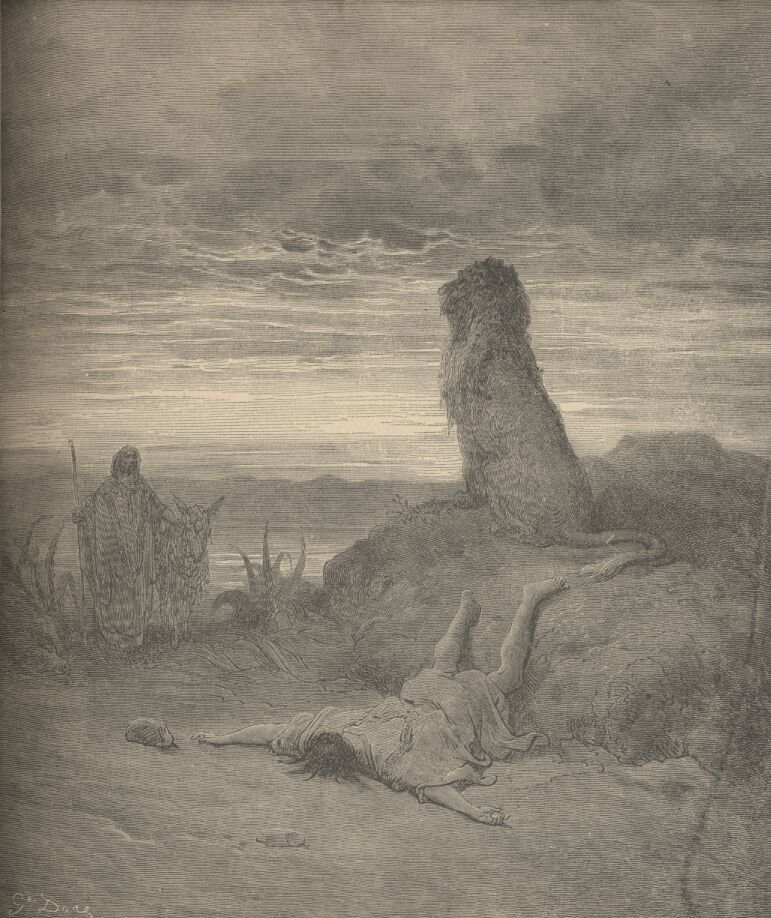
Now there dwelt an old prophet in Bethel; and his sons came and told him all the works that the man of God had done that day in Bethel: the words which he had spoken unto the king, them they told also to their father. And their father said unto them, What way went he? For his sons had seen what way the man of God went, which came, from Judah. And he said unto his sons, Saddle me the ass. So they saddled him the, ass: and he rode thereon, and went after the man of God, and found him sitting under an oak: and he said unto him, Art thou the man of God that camest from Judah? And he said, I am. Then he said unto him, Come home with me, and eat bread. And he, said, I may not return with thee, nor go in with thee: neither will I eat bread nor drink water with thee in this place: for it was said to me by the word of the Lord, Thou shalt eat no bread nor drink water there, nor turn again to go by the way that thou camest. He said unto him, I am a prophet also as thou art; and an angel spake unto me by the word of the Lord, saying, Bring him back with thee into thine house, that he may eat bread and drink water. But he lied unto him. So he went back with him, and did eat bread in his house, and drank water.
And it came to pass, as they sat at the table, that the word of the Lord came unto the prophet that brought him back: and he cried unto the man of God that came from Judah, saying, Thus saith the Lord, Forasmuch as thou hast disobeyed the mouth of the Lord, and hast not kept the commandment which the Lord thy God commanded thee, but camest back, and hast eaten bread and drunk water in the place, of the which the Lord did say to thee, Eat no bread, and drink no water; thy carcass shall not come unto the sepulchre of thy fathers.
And it came to pass, after he had eaten bread, and after he had drunk, that he saddled for him the ass, to wit, for the prophet whom he had brought back.
And when he was gone, a lion met him by the way, and slew him: and his carcass was cast in the way, and the ass stood by it, the lion also stood by the carcass.
And, behold, men passed by, and saw the carcass cast in the way, and the lion standing by the carcass: and they came and told it in the city where the old prophet dwelt. And when the prophet that brought him back from the way heard thereof, he said, It is; the man of God, who was disobedient unto the word of the Lord: therefore the Lord hath delivered him unto the lion, which hath torn him, and slain him, according to the word of the Lord, which he spake unto him. And he spake to his sons, saying, Saddle me the ass. And they saddled him.
And he went and found his carcass cast in the way, and the ass and the lion standing by the carcass: the lion had not eaten the carcass, nor torn the ass.—2 Kings xiii, 11-28.
ELIJAH DESTROYING THE MESSENGERS OF AHAZIAH.
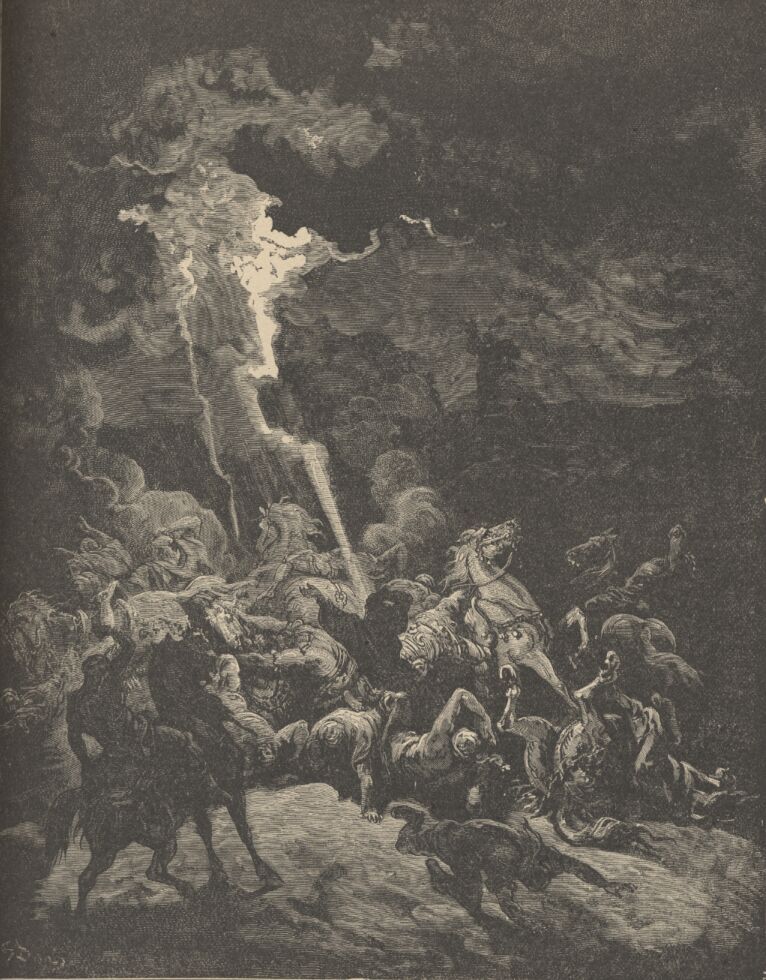
And Ahaziah fell down through a lattice in his upper chamber that was in Samaria, and was sick: and he sent messengers, and said unto them, Go, enquire of Baal-zebub the god of Ekron whether I shall recover of this disease.
But the angel of the Lord said to Elijah the Tishbite, Arise, go up to meet the messengers of the king of Samaria, and say unto them, Is it not because there is not a God in Israel, that 'ye go to enquire of Baal-zebub the god of Ekron? Now therefore thus saith the Lord, Thou; shalt not come down from that bed on which thou art gone up, but shalt surely die. And Elijah departed.
And when the messengers turned back unto him, he said unto them, Why are ye now turned back? And they said unto him, There came a man up to meet us, and said unto us, Go, turn again unto the king that sent you, and say unto him, Thus saith the Lord, Is it not because there is not a God in Israel, that thou sendest to enquire of Baal-zebub the god of Ekron? therefore thou shalt not come down from that bed on which thou art gone up, but shalt surely die. And he said unto them, What manner of man was he which came up to meet you, and told you these words? And they answered him, He was an hairy man, and girt with a girdle of leather about his loins. And he said, It is Elijah the Tishbite.
Then the king sent unto him a captain of fifty with his fifty. And he went up to him and, behold, he sat on the top of an hill. And he spake unto him, Thou man of God, the king hath said, Come down. And Elijah answered and said to the captain of fifty, If I be a man of God, then let fire come down from heaven, and consume thee and thy fifty. And there came down fire from heaven and consumed him and his fifty.
Again also he sent unto him another captain of fifty with his fifty. And he answered and said unto him, O man of God, thus hath the king said, Come down quickly. And Elijah answered and said unto them, If I be a man of God, let fire come down from heaven, and consume thee and thy fifty. And the fire of God came down from heaven and consumed him and his fifty.
And he sent again a captain of the third fifty with his fifty. And the third captain of fifty went up, and came and fell on his knees before Elijah, and besought him, and said unto him, O man of God, I pray thee, let my life, and the life of these fifty thy servants, be precious in thy sight. Behold, there came fire down from heaven, and burnt up the two captains of the former fifties with their fifties: therefore let my life now be precious in thy sight.
And the angel of the lord said unto Elijah, Go down with him: be not afraid of him. And he arose, and went down with him unto the king. And he said unto him, Thus saith the Lord, Forasmuch as thou hast sent messengers to enquire of Baal-zebub the god of Ekron, is it not because there is no God in Israel to enquire of his word? therefore thou shalt not come down off that bed on which thou art gone up, but shalt surely die.
So he died according to the word of the Lord which Elijah had spoken.—2 Kings i, 2-17.
ELIJAH'S ASCENT IN A CHARIOT OF FIRE.
| « Prev | DORE BIBLE GALLERY, COMPLETE | Next » |